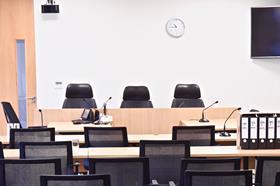The Solicitors Disciplinary Tribunal today declined to hear an application to open a private hearing to the public - as it had already rejected objections a month ago.

Christopher Mark Hutchings, a partner at London firm Hamlins LLP, faces allegations that in a telephone call with Solicitor G he ‘untruthfully and dishonestly’ stated that counsel had advised that ‘client A’ had a strong case for bringing contempt proceedings. Hutchings, admitted in 1992, denies all wrongdoing.
The hearing was initially in public with an anonymity order approved by the SDT in June to protect legal professional privilege. As a result, parts of the hearing concerning a consent order, a phone call and its aftermath would also be heard in private.
Following the first day of Hutchings’ substantive hearing in October, a report published online by The Times identified individuals covered by the anonymity order. The article was removed but the SDT, following submissions by the Law Society Gazette and other parties, ordered the hearing be in private as it ‘cannot adequately protect privilege of Client B in public session’.
The hearing then moved to private session. Two subsequent dates were listed as the privacy matters meant the substantive hearing could not be heard in the allocated time.
A month later, and a day before the adjourned hearing began, legal campaign group The Good Law Project announced it was ‘helping leading civil society organisations fight to protect the right to report on alleged wrongdoing within the legal profession’. It added: ‘Good Law Project has instructed leading counsel on behalf of the organisations, who will highlight the irony of the SDT preventing journalists from reporting on proceedings about a solicitor alleged to have used improper means to silence a journalist.’
Today, the SDT sat for the first of the two additional days listed for Hutchings’ hearing. The three-person panel sat in public to hear submissions from the parties including Anthony Hudson KC, for The Bureau of Investigative Journalism, The Foreign Policy Centre and Spotlight on Corruption, in regard to its application to sit in public.
Read more
Hudson said it was a ‘matter for the tribunal to reconsider’ adding: ‘The parties I represent did not have proper opportunity or real opportunity to make submissions on this matter.’
He told the tribunal that if he were able to make the application to the panel that the tribunal, after hearing submissions from him, would need to also consider if audio recordings of the private sessions would be made available. It was ‘significantly different’ for the panel to hear submissions from legal counsel, he said. ‘This is the first opportunity to be represented by leading counsel.’
For Hutchings, Ben Hubble KC said the tribunal should ‘decline to hear this application’ adding that it had already heard from parties, a member of the public and press.
He added: ‘It would appear Spotlight on Corruption were at the [14 October] hearing…and had the opportunity to make submissions but chose not to.’ He told the panel an email sent from the member of the public who made submissions against the hearing being moved to private copied in individuals from Spotlight on Corruption including deputy director Helen Taylor. ‘The tribunal’s decision, having heard all those,…said its earlier position was the right one,’ he said.
The panel, which retired briefly to consider the matter, refused to hear the application. Giving short reasons, SDT panel chair Lisa Boyce said: ‘This application is late, there is no reason given for the application being made in between month of the conclusion of the hearing in October and the letter of 17 November.’ Noting that the substantive hearing was nearly finished, Boyce said: ‘We are only hearing closing submissions. It would be contrary to our overriding objective to hear the application at this stage. The application to be heard is refused. We will move to private session.’
The hearing, in private, continues.






























